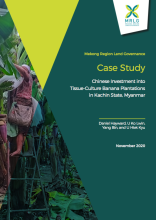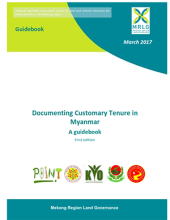Land Library Search
Through our robust search engine, you can search for any item of the over 73,000 highly curated resources in the Land Library.
If you would like to find an overview of what is possible, feel free to peruse the Search Guide.
/ library resources
Showing items 1 through 9 of 11.This brief consolidates the key findings from a larger Mekong Region Land Governance (MRLG) regional report Towards gender-equitable land policy and law-making in the Mekong Region.
The Summary Report of the 3rd Mekong Regional Land Forum provides a comprehensive review of the key messages from the event including a synthesis of keynote speeches, key take-aways, the links to all presentations and additional documentation.
In the last decade, Myanmar’s Kachin State has seen a boom in tissue-culture banana plantations driven by cross-border Chinese investors.
A common misconception about CT systems in Cambodia is that it is confined to indigenous communities in the peripheral uplands of Cambodia and does not exist in their Khmer counterparts.
This policy brief was developed in order to enable a meaningful engagement and policy dialogue with government institutions and other relevant stakeholders about challenges and opportunities related to the recognition of customary tenure in the Lao People’s Democratic Republic.
Objectives of this photo story are to collate updated data and information to identify and describe key issues and processes revolving around land in the Mekong region and to provide a basis for constructive dialogue and collaborative decision-making with different actors to address these is
Following the success of the inaugural Regional Land Forum in Hanoi in 2016, the Second Regional Land Forum was held from 28-30th May, 2018, in Bangkok. The Regional Land Forum
This guidebook provides conceptual, legal and practical tools and resources to help civil society organizations guide communities through the process of documenting customary tenure at the local level.
In Cambodia, the majority of the population is still composed of smallholder family farmers. 54% of the total labour force is employed in agriculture. They have access to 3.6 million ha of land, representing 19% of the country’s total land.









